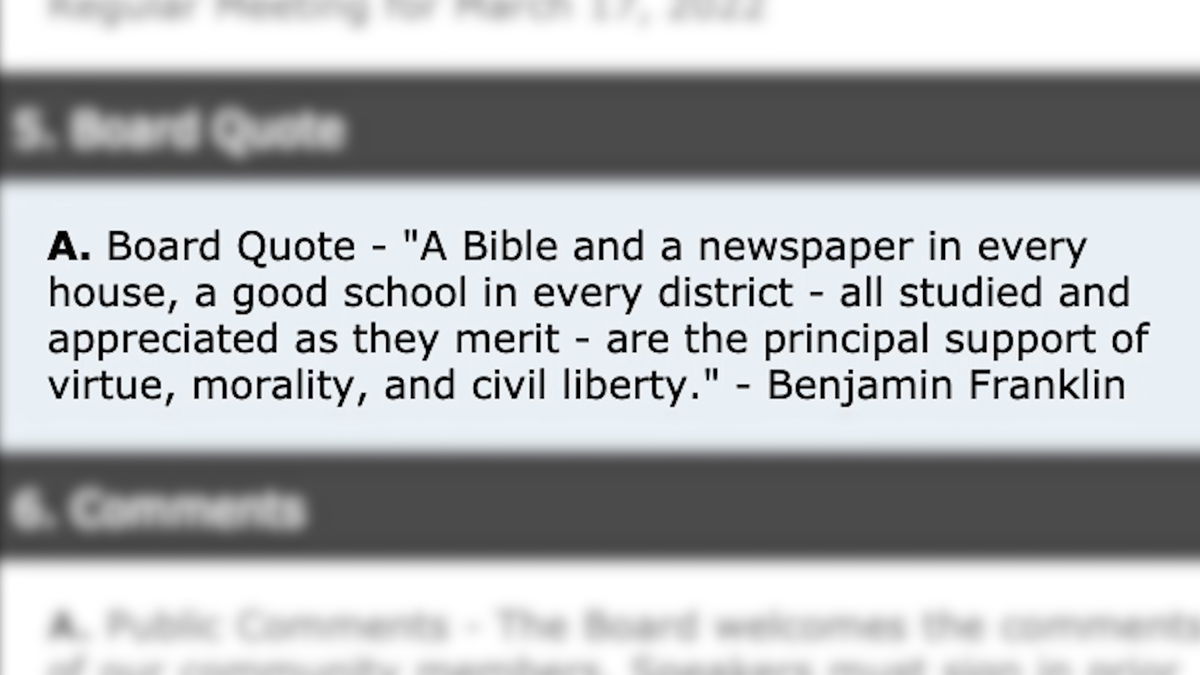D20 school board quote triggers separation of church and state controversy
COLORADO SPRINGS, Colo. (KRDO) -- A quote with religious undertones is triggering debates over what should be allowed during school board meetings in Southern Colorado.
At Thursday's Academy School District 20's School Board meeting, Aaron Salt, a recently elected School Board Director, is scheduled to read a quote from Benjamin Franklin aloud after the pledge of allegiance. The quote encourages a bible in every house.

A D20 spokesperson tells 13 Investigates they've received at least half a dozen complaints about the quote.
"Perhaps they don't see it as inappropriate in this public service context," said Avalon Manly, a high school teacher at Rampart High School in D20.
Manly is one of the individuals who sent a complaint to the district via email.
“I am alarmed at the suggestion that personal perspectives and personal religious perspectives are manifesting in a public board where people are working in a position of service,” Manly said.
According to D20, there are currently four policies in place that pertain to religion that exist for both staff and students. However, no such policy appears to exist when it comes to board members.
"School boards implying you need to read the bible or be a Christian to be a moral person is just not an appropriate message," said Chris Line, a staff attorney with the Freedom From Religion Foundation (FFRF). "It’s just going to exclude people."
"We receive complaints from all across the country all fifty states," Line told 13 Investigates. "(Members) report violations of the separation of church and state (to us). We work with them, and we contact school districts, school boards, and local governments. We try to make sure that these government entities are not promoting or endorsing religion."
"The Board of Education quotes are recited by board members as board meetings and are clearly government speech, which must not endorse religion," Line wrote in the letter to the D20 school board. "Furthermore, including religious messages as part of school board meetings sends an exclusionary message that alienates non-Christian and non-religious members of the Colorado Springs community."
The letter goes on to say that reciting a religious quote during a board meeting is very similar to a prayer, which violates the Establishment Clause of the First Amendment.
Salt, the school board member set to recite the quote, says he hasn't been asked by anyone at D20 to remove the quote from the Thursday meeting's agenda. In a statement to 13 Investigates, the board member says the letter sent by the FFRF is an attack on his own First Amendment rights.
We, as a board, have many discussions between the realm of the home and the realm of the school. This quote marries those two realms, highlighting the importance of both in the development of our students. I have read the letter, and I've confirmed with outside legal counsel who specialize in constitutional law that I have solid footing and am in no way violating the Establishment Cause. In fact, I believe this to be an assault on my own First Amendment rights, and I'm not going to perpetuate the trend of allowing elected officials to be bullied and silenced on false claims.
Aaron Salt, Academy School District 20 Board Director
Line with FFRF tells 13 Investigates if a pattern of behavior is established at Academy School District 20 showing that board members are using their positions as a means to promote religious messages then they would look into taking action. Line wouldn't specify exactly what those actions look like.
A U.S. District Judge decided in favor of FFRF in 2016, finding that “permitting religious prayer in board meetings, and the policy and custom of reciting prayers, bible readings, and proselytizing at board meetings, constitute unconstitutional government endorsements of religion in violation of plaintiffs’ First Amendment rights.”
The Chino Valley Unified School District Board appealed the District Judges decision but lost in 2019. The school board was ordered to pay more than $200,000 for the initial case.
